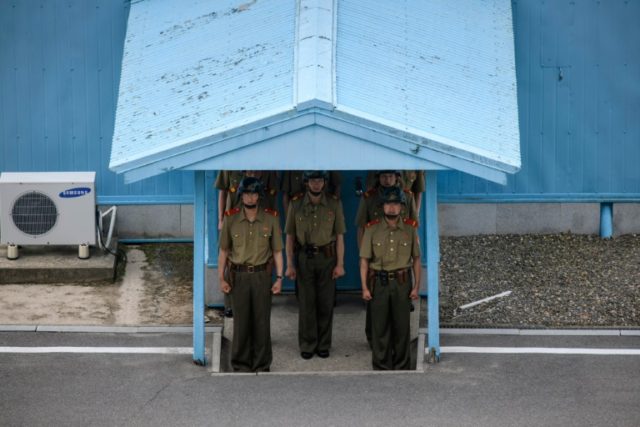The leftist government of South Korea banned Kim Myeong-sung, a journalist for South Korea’s largest newspaper who fled North Korea, from covering North-South talks in the border town of Panmunjom occurring Monday.
Chosun Ilbo newspaper, Kim’s employer, published a letter signed by the majority of reporters who make up the Unification Ministry’s press corps condemning his exclusion from the event. South Korean officials claimed the presence of a North Korean refugee at the talks, even one with South Korean citizenship, could pose a “safety” concern, according to South Korean news outlet Yonhap.
Opponents of the government of President Moon Jae-in have detailed how Seoul appears to have embarked upon a systematic campaign to reduce the visibility of North Korean refugees in South Korean society, urging human rights groups to stop advocating vocally against the communist regime of Kim Jong-un and shutting down opportunities for North Korean defectors to appear on television or in interviews. In moving against Kim Myeong-sung, however, Moon’s government appears to have taken the unprecedented step of censoring a South Korean citizen.
The fact that Chosun Ilbo has been among the most critical publications of Moon’s government, and particularly vocal about the rights of North Korean defectors, has exacerbated the national outrage against the Unification Ministry for its decision.
“High-level talks are held in a confined space, and Kim is widely known for his active reporting. We are asking for cooperation since the decision is deemed necessary under such special circumstances, rather than trying to restrict the press,” a ministry spokesperson told reporters, according to Yonhap. He added that the decision to exclude Kim came exclusively from Seoul and that Pyongyang had not pressured South Korean to exclude the reporter.
The meeting at the border town of Panmunjom on Monday brought together high-level North and South Korean officials to discuss logistics for the construction of a railway connecting the two countries. The two sides reported agreed on constructing the railway and planning for future family reunification meetings, bringing together relatives kept apart by the border for the first time in decades.
The meeting did not appear to discuss sensitive national security matters that would have endangered the safety of anyone involved, as the Unification Ministry claimed. Other nations have taken a more open approach to journalists whose family ties may tie them more closely to the event in question. In 2016, American journalist Jim Acosta, a member of America’s Cuban exile community, flew to Cuba and covered President Barack Obama’s joint press conference with dictator Raúl Castro, even asking Castro about the country’s gross human rights abuses (Castro denied them). Similarly, Carnival Cruises was forced to erase on a policy banning Cuban-Americans from its cruises to Cuba, a violation of the 1964 Civil Rights Act.
A coalition of journalists in South Korea argued on Monday that restricting Kim’s ability to report on a story would violate his freedom of the press, demanding an apology from the Moon government in a letter signed by dozens of members of the Unification Ministry press corps.
“It is unprecedented that the Ministry of Unification preemptively excluded certain reporters from the South-North talks in the South. The ministry should take the lead in protecting the rights of the refugees,” the reporters wrote, calling Kim’s exclusion a “serious violation of free speech.”
Chosun Ilbo editor Park Sang-hak called the decision to block his colleague “shocking.” “Defectors are also part of our people,” he argued. “This is repression by the Unification Ministry and an anti-constitutional act.”
The Unification Ministry has not apologized, instead calling his exclusion an “inevitable policy decision.”
While the most high-profile example of censorship of North Korean refugees by the Moon government, Kim’s experience is far from the first time that defectors and conservatives in South Korea generally criticize Moon for silencing concerns that North Korean defectors have regarding his government’s increasing closeness with Pyongyang. Multiple reports published this summer indicated a steep decline in the number of North Korean refugees appearing on television. North Korean refugees who have taken to human rights advocacy complained that they were not being allowed on television as often as in the past and felt censored and isolated.
“They asked my opinion about Kim Jong-un’s trip to South Korea. I told them we cannot believe him as people in North Korea always say ‘peace will only come after all the capitalists in the South disappear’. We shouldn’t be tricked by Kim Jong-un,” Choi Seong-guk, a defector who appeared on television, told the South China Morning Post in August. “Then, the host said: ‘Thank you very much’ and kicked me out of the show shortly after. It took less than five minutes.”
Defector appearances on radio and television dropped by 80 percent following the PyeongChang Winter Olympics in February, which prominently featured a North Korean delegation, according to the World Institute for North Korea Studies.”

COMMENTS
Please let us know if you're having issues with commenting.